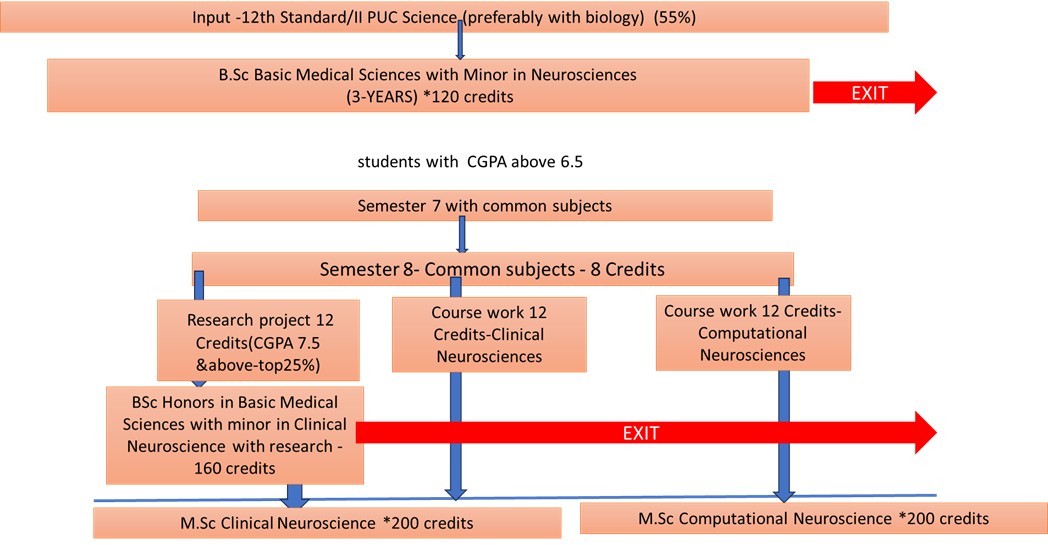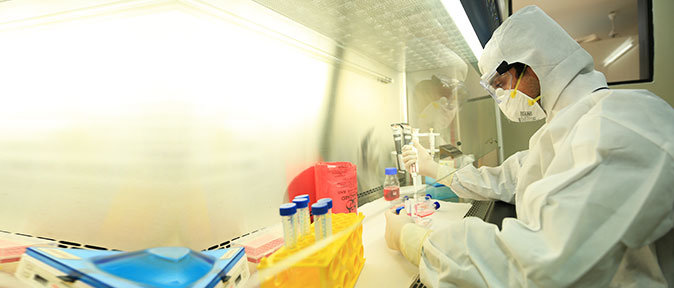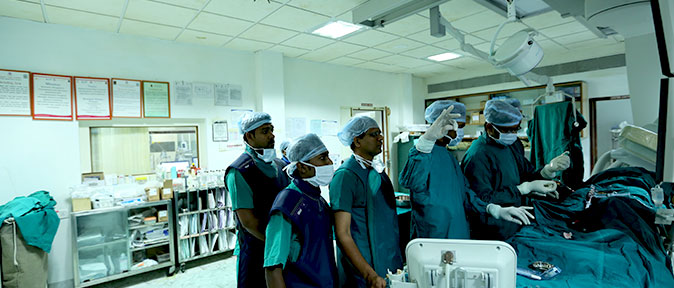Overview
Course Description
B.Sc. Basic Medical Sciences Degree Program, with possible progression to MSc in Clinical/Computational Neuroscience
B.Sc. Basic Medical Sciences (BSc. BMS) is an undergraduate program covering the broad spectrum of basic medical science subjects to help the graduate choose a career in basic medical sciences research and academics.
The goal of MSc in Clinical/Computational Neuroscience is to have students develop an essential understanding of scientific methods and specific techniques used by neuroscientists, in an atmosphere in which the relevance of neuroscience research to the human condition is kept at the forefront. The course will also provide exposure to professional character, leadership, continued development and ethics.

Focus
The main focus of the BSc program is to gain basic knowledge in basic medical subjects including Anatomy, Physiology, Biochemistry, Pathology, Pharmacology, Microbiology, Nutrition, Forensic Science, Genetics, Public Health and various subjects related to neurosciences through lectures and hands-on training, culminating in a group research project work. After the successful completion of the program, students can pursue either honors degree in Basic Medical Sciences or masters in Clinical or Computational Neurosciences if they meet the eligibility criteria.
If the students opt for Clinical Neuroscience in the Masters years, they will undertake a detailed study of Applied Neuroanatomy, Neurology, Models in Neuroscience, Neurophysiology, Neuroendocrinology, Behavioral Neurosciences and Neuroimaging among others with hands on training in the latest techniques.
If the students opt for Computational Neuroscience in the Masters years, they will study Biomedical Neuroscience, Mathematics for Neuroscience, Python programming, BCI and signal processing using MATLAB, Machine learning and deep learning, AI and Neuroimaging among others.
Career Prospects
B.Sc. (Basic Medical Sciences)
Meritorious graduates with B.Sc. (Basic Medical Sciences) will be eligible to gain postgraduate admissions in various fields including medical sciences (Anatomy, Physiology, Biochemistry, Pharmacology, Microbiology, Forensic Science, Clinical Embryology, Clinical Virology etc.) health sciences eg. Public health and life sciences (Medical Biotechnology, Molecular Biology and Human Genetics, Biotherapeutics etc.) in India and abroad. A postgraduate degree helps one have better career prospects.
B.Sc. (Honours) in Basic Medical Sciences
Graduates who complete the honours program will be eligible to pursue PhD without Master’s Degree as per NEP2020 as well as go abroad for higher studies.
MSc Clinical Neurosciences ensures a successful pursuit of future career in academia (Dept. of Neurosciences), medicine (as research associates in departments like neurology, neurosurgery and oncology) and research.
Examples and options to pursue in the Industry: Pharmaceutical Industry, Medical Devices, Artificial Intelligence, Cognitive Computing etc.
Job opportunities for MSc in Computational Neuroscience are listed below.
Academia and Research
1. Professor/Lecturer: Teach courses and conduct research at universities or colleges.
2. Research Scientist: Conduct experiments, analyze data, and contribute to scientific knowledge in neuroscience.
3. Postdoctoral Researcher: Engage in advanced research, typically under the supervision of senior scientists.
Industry
1. Data Scientist: Analyze large datasets to uncover insights, often working with neural data.
2. Bioinformatics Specialist: Use computational tools to understand biological data, particularly in genetics and genomics.
3. Neuroscientist in Pharma/Biotech: Work on drug discovery, development, and testing by understanding neurological processes and disorders.
Healthcare and Clinical Applications
1. Neurotechnologist: Develop and implement technology for neurological diagnostics and treatments.
2. Clinical Data Analyst: Analyze clinical trial data, particularly in neuroscience-related studies.
3. Medical Science Liaison: Bridge the gap between clinical practice and research, often working with pharmaceutical companies or with engineers.
Technology and Engineering
1. Neuroengineer: Design and develop devices and systems that interact with neural systems, such as brain-computer interfaces.
2. Robotics Engineer: Apply principles of neuroscience to develop intelligent robotic systems.
3. Software Developer: Create software tools for simulating neural networks, data analysis, or managing large datasets in neuroscience.
Government and Policy
1. Science Policy Analyst: Advise on policy related to science and technology, particularly in neuroscience and public health.
2. Grant Writer/Manager: Assist in securing funding for research projects and managing grant-funded programs.
Entrepreneurship
1. Startup Founder/CEO: Start your own company focused on innovative solutions in neuroscience, such as neurotechnology or health tech.
2. Product Manager: Oversee the development and launch of products related to neuroscience and computational tools.
Key Dates & Deadlines
15
Mar 15 26
Mar ' 26
Last date to Apply
'
Tentative Course Commencement Date
Indian Students Apply
Manipal Academy of Higher Education not only caters to one’s academic needs, but also lays emphasis on all-round development of its students.
International Students Apply
Manipal Academy of Higher Education not only caters to one’s academic needs, but also lays emphasis on all-round development of its students.
Indian Students Apply
Manipal Academy of Higher Education not only caters to one’s academic needs, but also lays emphasis on all-round development of its students.
International Students Apply
Manipal Academy of Higher Education not only caters to one’s academic needs, but also lays emphasis on all-round development of its students.
Duration :
B.Sc. degree shall extend over three academic years divided into six semesters of 6 months. BSc Honors program shall extend over four years divided into 8 semesters and MSc shall extend over five years divided into ten semesters.
Any student who has completed the first six semesters with a CGPA of 7.5 or above and reaches the top 25% of the class, can progress to the fourth year in which they will pursue a research project in addition to postgraduate level subjects and they can exit with B.Sc. Honors with Research in Basic Medical Sciences (minor in Clinical Neurosciences will be mentioned in transcript) at the end of the fourth year.
Any student who has completed the first six semesters with a CGPA of 6.5 or above but are not shortlisted for the research project can progress to the fourth year and they can pursue studies in either Clinical Neuroscience or Computational Neuroscience as per their choice. Students completing the 5th year of study will get M.Sc. in Clinical Neuroscience or M.Sc. in Computational Neuroscience in addition to the BSc degree.
Facilities

Laboratories
The Department of Neurology has EEG/ENMG Labs.

Libraries
Libraries have excellent resources for reference and study

Hospitals
Teaching hospitals give students hands-on learning
![Program]() Program
Program
![Program]() News
News
- “Bad practice in Medicine must be rooted out,” World Medical Education President Prof David Gordon tells graduating students
- “Bad practice in Medicine must be rooted out,” World Medical Education President Prof David Gordon tells graduating students
- “Bad practice in Medicine must be rooted out,” World Medical Education President Prof David Gordon tells graduating students





